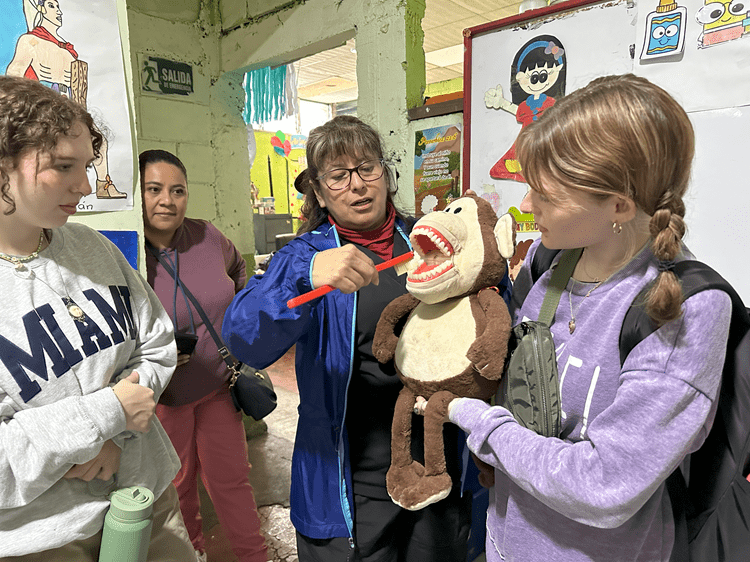A recent travel service learning program from Tennessee to Guatemala included takeaways for future short-term international volunteers. Beyond the purchased handwoven cloths, aching shoulders from paddleboarding at sunrise, and photos captured on the hiking trail, the intent was to do good and do no harm. Veteran program Co-Leaders Stacie Freeman and Jennifer Southerland-Miller were familiar with mistakes often made by well-intentioned but ill-informed service projects. They pulled from decades of experience as student tour planners and created experiences that led to conversations challenging traditional service-oriented thinking.
Service on this six-day adventure focused on making a difference in children’s lives. A dental program translated into the 13 volunteers teaching English words, demonstrations on how-to on use of the gifts of toothbrushes and other dental care items, and painting to help a community center be an even brighter spot to achieve its mission of improving the health and wellbeing of indigenous women and children.
“As we reflected with our program leaders and nonprofit partners, the importance of conducting short-term service trips without causing harm was emphasized,” noted Freeman, Co-Founder of Global Citizen Adventure Corps and director of the Global Studies Department at Bethel University, the partners who made the international learning and college credit possible.
Here are a few of the overarching themes of the conversations that make great tips for other short-term international volunteers:
Collaborate Rather Than Dictate
Partner with established local organizations that have a deep understanding of the community’s needs. This collaboration can help ensure your efforts align with the long-term goals of the community.
Know Before You Go
Take the time to learn about the local culture, traditions, and social norms. This understanding will guide interactions and help prevent unintentional disrespect. (That’s why GCAC programs offer the option of enrolling in Bethel University’s global service learning courses prior to departure.)
Donate Time and Money
Consider providing financial support to local initiatives in addition to bringing in requested supplies. While some supplies are not available locally, many are. If you are working with a local group, they will know what is not in supply and what can be purchased within the community, thereby helping meet the need and grow the economy.
Listen and Learn
Approach the experience with humility and a willingness to learn. Listening to community members can provide invaluable insights into their needs and challenges.
Care and Share
After returning home, take time to reflect on what you learned and how you can continue to support the community from afar. Share your insights with others to promote more responsible volunteering.
“Volunteering responsibly, especially in the context of short-term service trips, is essential to ensure that our efforts are truly beneficial to the communities we aim to serve,” concluded Freeman.

